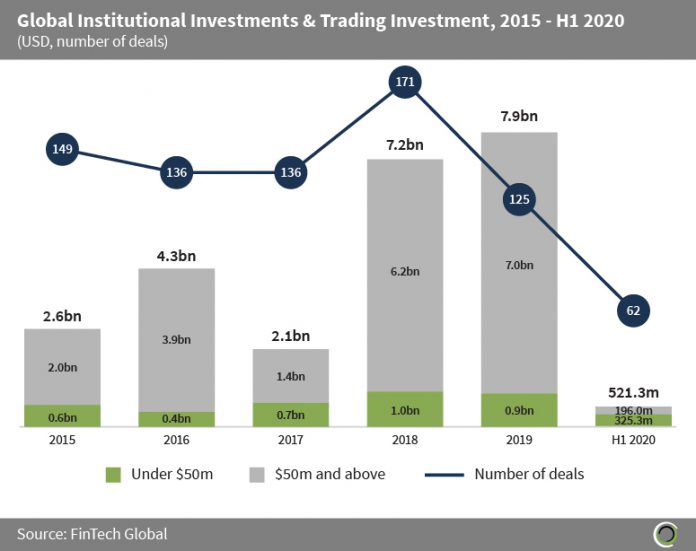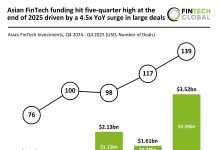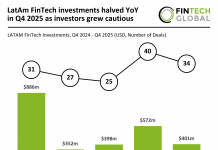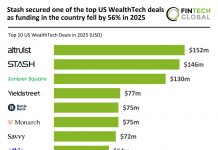The global Institutional Investments & Trading sector recorded only $521.3m of funding in the first half of 2020 which is only 12.4% of the levels seen in H1 2019
- Total capital invested in the Institutional Investment & Trading sector more than tripled from 2017 to 2019, reaching a record high of $7.9bn. The record funding levels were mainly driven by large deals over $50m which raised in aggregate $7.0bn of the total for the year.
- The sector was relatively erratic in total funding from 2015 to 2017, with total capital invested almost doubling from 2015 to 2016 but then decreasing more than two-fold the following year. It was only in 2018 and 2019 that the sector saw a splurge of funding and deal activity.
- While deal activity has fluctuated year-on-year, there was a 30.7% decrease in deal activity from 2018 to 2019, while in contrast total funding increased 9.8% during the same period.
- In 2019, total funding for the first half of the year topped $4.2bn with 57 deals completed. In H1 2020, the total funding was just over $521m. The shocking 87.6% drop in total funding signals the abysmal year the Institutional Investments & Trading sector is having. The significant drop in funding is primarily caused by the lack of large deals. In H1 2019, there were ten deals completed over $50m. That number dropped 80% to just two deals completed in H1 2020 in that size range. From H1 2019 to H1 2020, the average deal size declined 84.7% from $74m to just over $11m.
The United States captures half of the top ten deals in H1 2020 despite continuing to lose grip of the sector
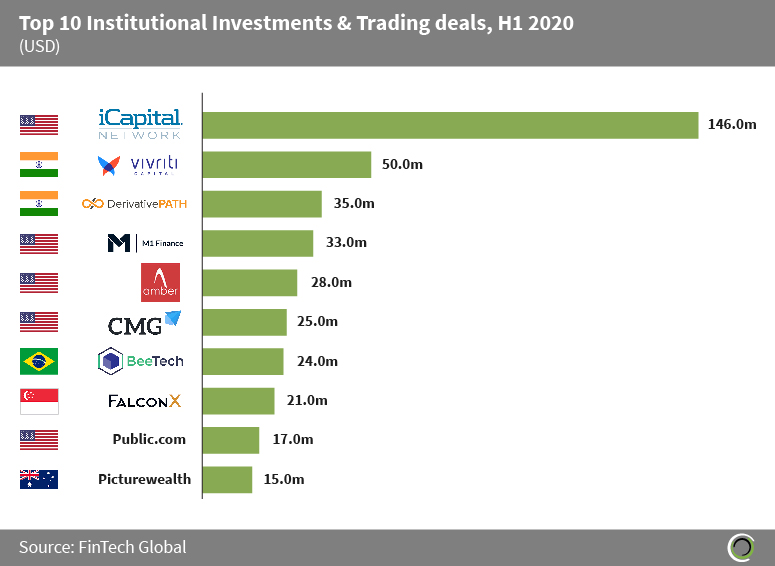
- The absence of substantial funding in H1 2020 is certainly due to a lack of large deals. The total capital raised in the top ten deals in H1 2019 was nearly 6x larger than the total funding from these deals in the first six months of this year. In aggregate, the top ten deals for H1 2019 raised $3.6bn, while in H1 2020, the top transactions raised in total only $416m, highlighting the molasses year 2020 is becoming for the sector due to Covid-19 and the continued economic uncertainty.
- The largest deal was completed by iCapital Network, the retail investing and trading giant, which raised $146m in a Series B round from Barclays and nine other investors to enhance its platform technology and expand functionality. iCapital Network serviced more than $46.6bn in assets across more than 470 funds in 2019 with nearly 4,000 registered network members.
- The top ten deals of H1 2020 accounted for nearly 80% of total funding for the period. The United States captured half of the top ten deals for H1 2020. Public.com, the US social investing platform, raised $17m in a Series B round from 12 investors. The company announced that it would use the funds to continue to make stock market investing more accessible to more people. The app has drawn serious attention following investments from actor Will Smith and American football player JJ Watt.
- Although the United States was home to half of the top ten deals for H1 2020, Europe share of the Institutional Investments & Trading sector rose 14.4 percentage points (pp). Meanwhile, the US share of the sector continues to decline.
Europe nearly toppled North America for the top spot in deal activity in the Institutional Investments & Trading sector
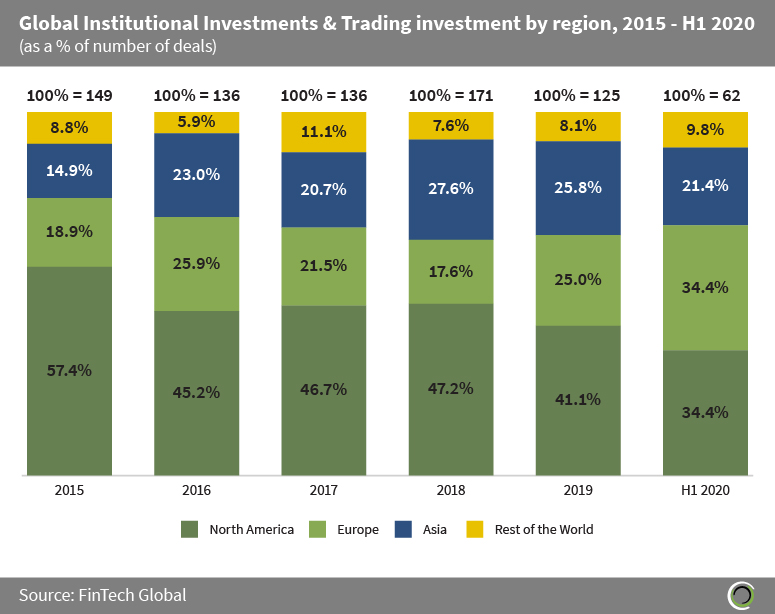
- Institutional Investments & Trading continued to see high growth rates in investment out of Europe since 2018. Since 2017, Europe share of deal activity in the subsector has nearly doubled. The 16.8 percentage points (pp) increase in deal share from 2018 to H1 2020 is consistent with a maturing sector as European countries continue to adopt new technologies and explore new avenues of investment.
- North America, a region which was home to nearly 60% of all deal activity in 2015, has seen nearly a constant decline in its deal share. Since 2015, North American companies share of total transactions has seen a 23pp decline.
- While this should be expected as other regions develop new companies and technology to enter the space, the 6.7pp drop from 2019 to H1 2020 is due to none other than Covid-19. Investors were tentative with their investments as the United States has been inconsistent with lockdown rules and with no immediate cure for the virus, investors are sure to be weary with their investments until the economy can gain stable footing and businesses can welcome back customers in full number.
- Asia has seen a 6.2pp decline in deal activity since 2018, coming at an unsurprising time with restrictions on trading platforms tightening along with Covid-19. In 2019, China restricted foreign exchange trading by tightening cross-border capital controls and placing a ban on currency margin trading, in which investors borrow money to trade. China also banned bitcoin and other cryptocurrency exchanges.
Deals sized above $50m nearly disappear as Global Institutional Investments & Trading investment collapses.
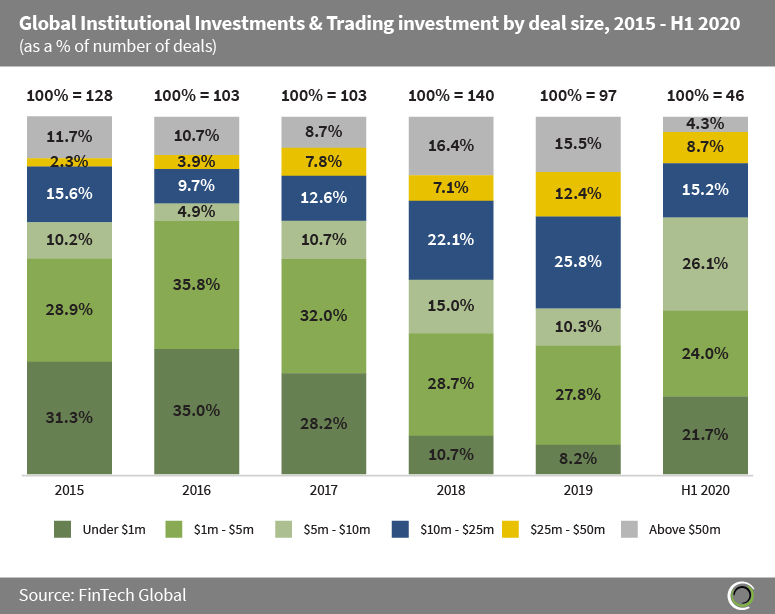
- H1 2020 marks the first time that the share of deals over $50m has decreased since 2015. The 11.2pp decline in H1 2020 is a combination of both Covid-19 affecting investors and their predictions as well as the byproduct of lockdown. With many people stuck inside, investing platforms saw an enormous increase in usage, especially in day trading. The uptick didnt sit well with economists, prompting a battle veteran traders and new-coming day traders. Although it drew more attention to the platforms, the investing sites were plagued with outages, technical issues, and delayed stock quotes. The army of day traders slowly dwindled down as the global economy regained a bit of footing, causing traders to make poor trades as not every stock was bound to go up.
- Deals under $1m rose significantly, increasing by 13.5pp. Paired with the decline in deals above $50m and a 3.7pp decrease in deals between $25m-50m, the trend signals sector trouble and investor worry.
- The only deal category to see a rise was deals between $5m-10m. The increase may be a downscale from high value deals by investors. Seeing that the economy has continued to fluctuate, the need for investing and trading platforms has diminished as both companies and families are holding onto their money. With an upcoming US election that may lead to an increase on corporation taxes, the economic shakedown has nothing to quell the fears.
The data for this research was taken from the FinTech Global database. More in-depth data and analytics on investments and companies across all FinTech sectors and regions around the world are available to subscribers of FinTech Global.??2020 FinTech Global


